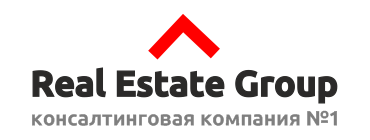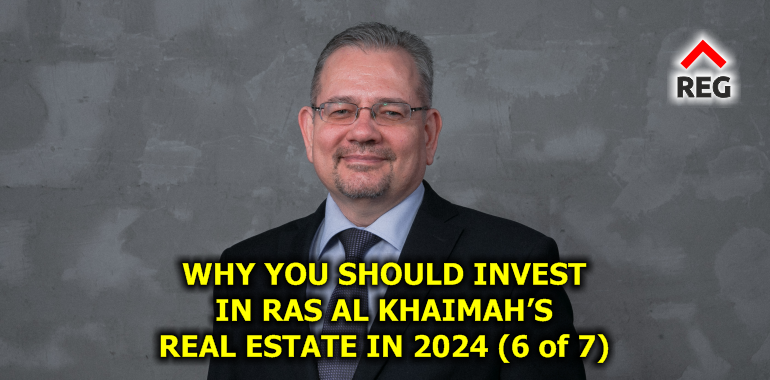Want to Buy Real Estate in Ras Al Khaimah? Write a Request in WhatsApp and Real Estate Group Will Find the Best Options for You. Everyone Buys With Us!
Chapter 6. Price Growth Forecasts for Properties in Ras Al Khaimah.
Ras Al Khaimah is one of the fastest-growing emirates in the UAE, with a booming real estate market that offers attractive opportunities for investors and end-users. The emirate has a range of properties, such as studios, apartments, houses, and villas, in various locations, such as Al Marjan Island, Mina Al Arab, Dafan Al Nakheel, Yasmin Village, and Al Hamra Village. In this article, we will explore the price growth forecasts for these properties in these locations, based on the current trends and future projections.
1. Al Marjan Island.
Al Marjan Island is a man-made island that offers a luxurious and modern lifestyle, with a range of world-class facilities and amenities, such as resorts, hotels, restaurants, and beaches.
According to Real Estate Group, the average price of an apartment in Al Marjan Island is AED 745 ($203) per sq. ft., which is a 7.49% increase from 2022. The average rental yield of an apartment in Al Marjan Island is 6.32%.
Based on the historical data and the expected demand, the price growth forecast for apartments in Al Marjan Island is as follows:
- 2024: AED 800 ($218) per sq. ft. (7.38% increase)
- 2025: AED 860 ($234) per sq. ft. (7.5% increase)
- 2026: AED 925 ($252) per sq. ft. (7.56% increase)
- 2027: AED 995 ($271) per sq. ft. (7.57% increase)
- 2028: AED 1,070 ($291) per sq. ft. (7.54% increase)
An example of an apartment in Al Marjan Island is Pacific by Select Group, which offers studios, 1-bedroom, and 2-bedroom units, with sea views, balconies, swimming pools, gyms, and parking spaces. A studio in Pacific by Select Group costs around AED 250,000 ($68,120), a 1-bedroom unit costs around AED 664,000 ($180,926), and a 2-bedroom unit costs around AED 1,078,000 ($293,733).
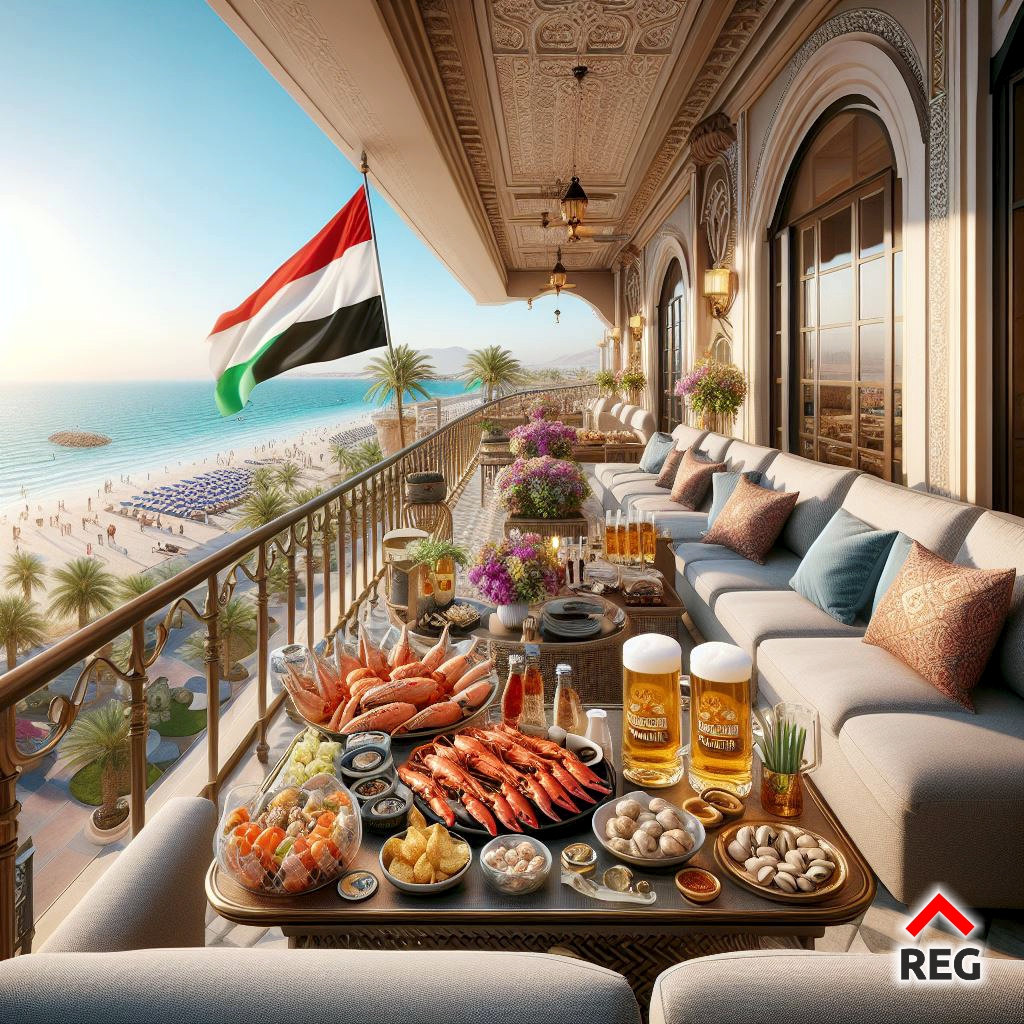
2. Mina Al Arab.
Mina Al Arab is a master-planned community that offers a mix of natural and urban elements, creating a harmonious and sustainable environment. It has a range of world-class facilities and amenities, such as lagoons, ecological reserves, malls, and schools.
According to Real Estate Group, the average price of an apartment in Mina Al Arab is AED 722 ($197) per sq. ft., which is a 0.90% decrease from 2022. The average rental yield of an apartment in Mina Al Arab is 6.35%.
Based on the historical data and the expected demand, the price growth forecast for apartments in Mina Al Arab is as follows:
- 2024: AED 740 ($202) per sq. ft. (2.49% increase)
- 2025: AED 760 ($207) per sq. ft. (2.7% increase)
- 2026: AED 785 ($214) per sq. ft. (3.29% increase)
- 2027: AED 810 ($221) per sq. ft. (3.18% increase)
- 2028: AED 840 ($229) per sq. ft. (3.7% increase)
An example of an apartment in Mina Al Arab is Bermuda by RAK Properties, which offers 1-bedroom, 2-bedroom, and 3-bedroom units, with lagoon views, balconies, swimming pools, gyms, and parking spaces. A 1-bedroom unit in Bermuda by RAK Properties costs around AED 656,000 ($178,746), a 2-bedroom unit costs around AED 1,105,000 ($301,090), and a 3-bedroom unit costs around AED 1,483,000 ($404,087).
3. Dafan Al Nakheel.
Dafan Al Nakheel is a vibrant and cosmopolitan community that offers a mix of traditional and modern elements, creating a lively and diverse environment. It has a range of world-class facilities and amenities, such as malls, hotels, cinemas, and hospitals.
According to Real Estate Group, the average price of an apartment in Dafan Al Nakheel is AED 491 ($134) per sq. ft., which is unchanged from 2022. The average rental yield of an apartment in Dafan Al Nakheel is 7.03%.
Based on the historical data and the expected demand, the price growth forecast for apartments in Dafan Al Nakheel is as follows:
- 2024: AED 505 ($138) per sq. ft. (2.85% increase)
- 2025: AED 520 ($141) per sq. ft. (2.97% increase)
- 2026: AED 540 ($147) per sq. ft. (3.85% increase)
- 2027: AED 560 ($152) per sq. ft. (3.7% increase)
- 2028: AED 585 ($159) per sq. ft. (4.46% increase)
An example of an apartment in Dafan Al Nakheel is Al Hamra Village by Al Hamra Real Estate Development, which offers studios, 1-bedroom, 2-bedroom, and 3-bedroom units, with golf course views, balconies, swimming pools, gyms, and parking spaces. A studio in Al Hamra Village by Al Hamra Real Estate Development costs around AED 300,000 ($81,743), a 1-bedroom unit costs around AED 460,000 ($125,340), and a 2-bedroom unit costs around AED 750,000 ($204,360).
4. Yasmin Village.
Yasmin Village is a serene and scenic community that offers a mix of natural and urban elements, creating a tranquil and beautiful environment. It has a range of world-class facilities and amenities, such as lakes, forests, hotels, and spas.
According to Real Estate Group, the average price of an apartment in Yasmin Village is AED 259 ($70) per sq. ft., which is a 4.23% decrease from 2022. The average rental yield of an apartment in Yasmin Village is 11.8%.
Based on the historical data and the expected demand, the price growth forecast for apartments in Yasmin Village is as follows:
- 2024: AED 265 ($72) per sq. ft. (2.32% increase)
- 2025: AED 270 ($73) per sq. ft. (1.89% increase)
- 2026: AED 280 ($76) per sq. ft. (3.7% increase)
- 2027: AED 290 ($79) per sq. ft. (3.57% increase)
- 2028: AED 300 ($82 ) per sq. ft. (3.45% increase)
An example of an apartment in Yasmin Village is Yasmin Village by RAK Properties, which offers 1-bedroom, 2-bedroom, and 3-bedroom units, with lake views, balconies, swimming pools, gyms, and parking spaces. A 1-bedroom unit in Yasmin Village by RAK Properties costs around AED 237,000 ($64,578), a 2-bedroom unit costs around AED 300,000 ($81,744), and a 3-bedroom unit costs around AED 510,000 ($138,964).
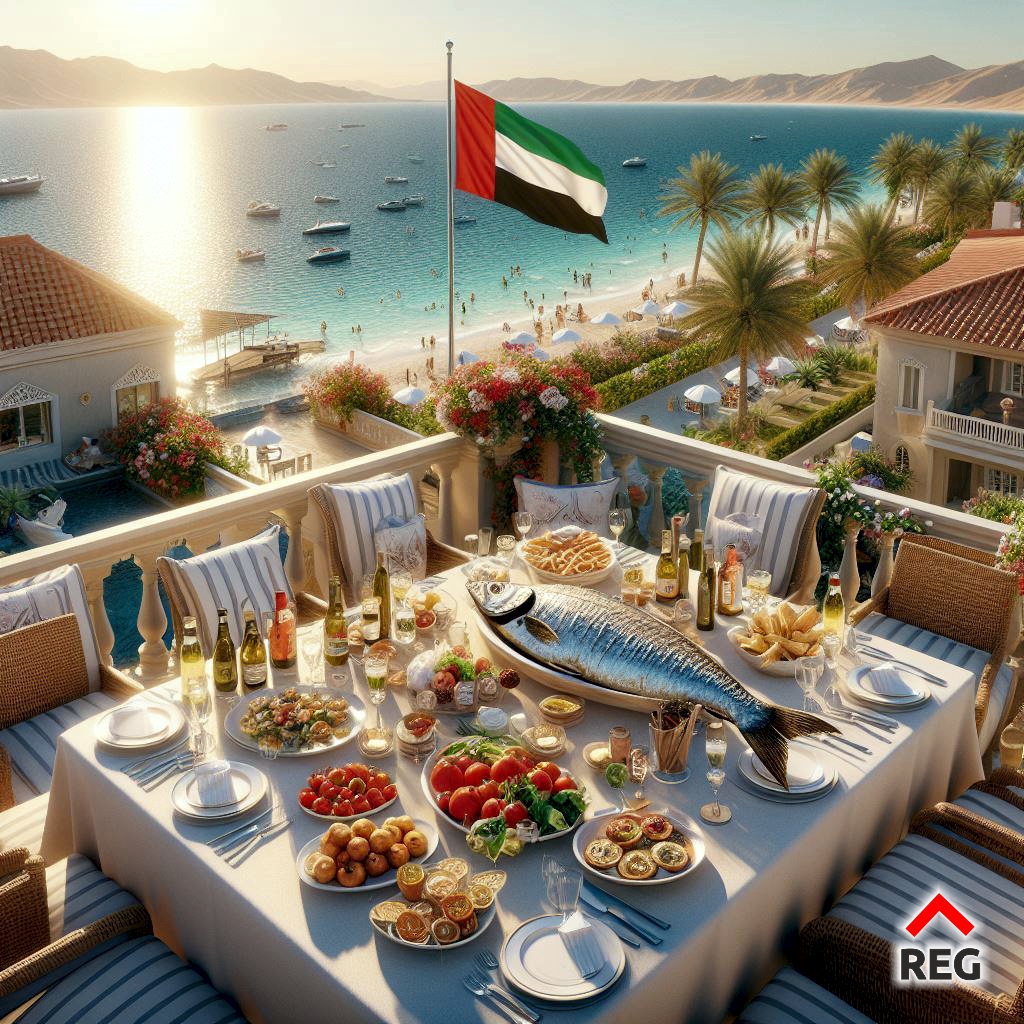
5. Al Hamra Village.
Al Hamra Village is a master-planned community that offers a luxurious and modern lifestyle, with a range of world-class facilities and amenities, such as golf courses, marinas, resorts, and beaches.
According to Real Estate Group, the average price of an apartment in Al Hamra Village is AED 596 ($162) per sq. ft., which is a 4.28% increase from 2022. The average rental yield of an apartment in Al Hamra Village is 7.17%.
Based on the historical data and the expected demand, the price growth forecast for apartments in Al Hamra Village is as follows:
- 2024: AED 615 ($167) per sq. ft. (3.19% increase)
- 2025: AED 635 ($173) per sq. ft. (3.25% increase)
- 2026: AED 655 ($178) per sq. ft. (3.15% increase)
- 2027: AED 680 ($185) per sq. ft. (3.82% increase)
- 2028: AED 705 ($192) per sq. ft. (3.68% increase)
An example of an apartment in Al Hamra Village is Royal Breeze by Al Hamra Real Estate Development, which offers studios, 1-bedroom, 2-bedroom, and 3-bedroom units, with golf course views, balconies, swimming pools, gyms, and parking spaces. A studio in Royal Breeze by Al Hamra Real Estate Development costs around AED 300,000 ($81,744), a 1-bedroom unit costs around AED 450,000 ($122,615), and a 2-bedroom unit costs around AED 700,000 ($190,736).
Chapter 7. Taxes, Fees, Levies and Surcharges for Real Estate Investors in Ras Al Khaimah in 2024.
Ras Al Khaimah is one of the most attractive destinations for real estate investors in the UAE, as it offers a range of properties, such as studios, apartments, houses, and villas, in various locations, such as Al Marjan Island, Mina Al Arab, Dafan Al Nakheel, Yasmin Village, and Al Hamra Village. However, before investing in real estate in Ras Al Khaimah, it is important to be aware of the taxes, fees, levies and surcharges that apply to different types of transactions and strategies.
In this article, Real Estate Group will explain the costs and charges that real estate investors will need to pay in Ras Al Khaimah in 2024, based on the following four strategies:
- Flipping - buying ready-made apartments, making modern repairs, improvements, individual design, furniture, kitchen and household appliances, lighting, decor and reselling them.
- Buying ready-made apartments, carrying out in them modern repair, improvement, individual design, furniture, kitchen and household appliances, lighting, decor and renting them for long-term rent for 1 year or more.
- Buying apartments in residential complexes under construction with subsequent resale for a quick profit.
- Buying apartments in residential complexes under construction and then renting them out for a period of 1 year or more.
Strategy 1: Flipping.
Flipping is a strategy that involves buying ready-made apartments, making modern repairs, improvements, individual design, furniture, kitchen and household appliances, lighting, decor and reselling them for a higher price. This strategy can generate a high return on investment (ROI) in a short period of time, if the investor can find a good deal, renovate the property efficiently, and sell it quickly.
However, flipping also involves a number of costs and charges that the investor will need to pay in Ras Al Khaimah in 2024, such as:
- Transfer fee: This is a fee that is paid to the Real Estate Department (the Department) at the RAK Municipality for transferring the ownership of the property from the seller to the buyer. The transfer fee is 4% of the property value, which is split equally between the seller and the buyer. Therefore, the investor will need to pay 2% of the property value as a transfer fee when buying the property, and another 2% when selling the property.
- Registration fee: This is a fee that is paid to the Department for registering the property and the property rights on the Real Estate Register, which is a database that records the details of all real estate properties and transactions in Ras Al Khaimah. The registration fee is 1% of the property value, which is split equally between the seller and the buyer. Therefore, the investor will need to pay 0.5% of the property value as a registration fee when buying the property, and another 0.5% when selling the property.
- Agency fee: This is a fee that is paid to the real estate agent or broker for facilitating the purchase and sale of the property. The agency fee is usually 2% of the property value, which is paid by the seller. However, some agents or brokers may charge a different percentage or a fixed amount, depending on the agreement between the parties. Therefore, the investor will need to pay the agency fee as agreed when selling the property.
- Renovation cost: This is the cost of making modern repairs, improvements, individual design, furniture, kitchen and household appliances, lighting, decor and any other changes to the property to increase its value and appeal. The renovation cost will vary depending on the size, condition, and location of the property, as well as the quality and extent of the renovation. Therefore, the investor will need to budget for the renovation cost and compare it with the expected profit margin before buying the property.
- Maintenance fee: This is a fee that is paid to the master developer or the owners’ association for maintaining the common areas and facilities of the property, such as the lobby, the elevator, the swimming pool, the gym, the security, and the landscaping. The maintenance fee is usually calculated based on the size of the property and the level of service provided. Therefore, the investor will need to pay the maintenance fee as long as they own the property.
- Utility bills: These are the bills that are paid for the consumption of water, electricity, gas, and other utilities in the property. The utility bills are usually calculated based on the meter readings and the tariff rates. Therefore, the investor will need to pay the utility bills as long as they own the property.
Strategy 2: Buying and Renting.
Buying and renting is a strategy that involves buying ready-made apartments, carrying out in them modern repair, improvement, individual design, furniture, kitchen and household appliances, lighting, decor and renting them for long-term rent for 1 year or more. This strategy can generate a steady income stream and a long-term capital appreciation for the investor, if the investor can find a good deal, maintain the property well, and find reliable tenants.
However, buying and renting also involves a number of costs and charges that the investor will need to pay in Ras Al Khaimah in 2024, such as:
- Transfer fee: This is a fee that is paid to the Department for transferring the ownership of the property from the seller to the buyer. The transfer fee is 4% of the property value, which is split equally between the seller and the buyer. Therefore, the investor will need to pay 2% of the property value as a transfer fee when buying the property.
- Registration fee: This is a fee that is paid to the Department for registering the property and the property rights on the Real Estate Register. The registration fee is 1% of the property value, which is split equally between the seller and the buyer. Therefore, the investor will need to pay 0.5% of the property value as a registration fee when buying the property.
- Agency fee: This is a fee that is paid to the real estate agent or broker for facilitating the purchase and rental of the property. The agency fee is usually 2% of the property value, which is paid by the seller, and 5% of the annual rent, which is paid by the tenant. However, some agents or brokers may charge a different percentage or a fixed amount, depending on the agreement between the parties. Therefore, the investor will need to pay the agency fee as agreed when buying and renting the property.
- Renovation cost: This is the cost of making modern repairs, improvements, individual design, furniture, kitchen and household appliances, lighting, decor and any other changes to the property to increase its value and appeal. The renovation cost will vary depending on the size, condition, and location of the property, as well as the quality and extent of the renovation. Therefore, the investor will need to budget for the renovation cost and compare it with the expected rental income before buying the property.
- Maintenance fee: This is a fee that is paid to the master developer or the owners’ association for maintaining the common areas and facilities of the property. The maintenance fee is usually calculated based on the size of the property and the level of service provided. Therefore, the investor will need to pay the maintenance fee as long as they own the property.
- Utility bills: These are the bills that are paid for the consumption of water, electricity, gas, and other utilities in the property. The utility bills are usually calculated based on the meter readings and the tariff rates. Therefore, the investor will need to pay the utility bills as long as they own the property. However, some investors may choose to pass on the utility bills to the tenants, depending on the agreement between the parties.
- Rental income tax: This is a tax that is paid on the income generated from renting the property. The rental income tax is 10% of the gross annual rent, which is deducted at source by the Department. Therefore, the investor will need to pay the rental income tax as long as they rent the property.
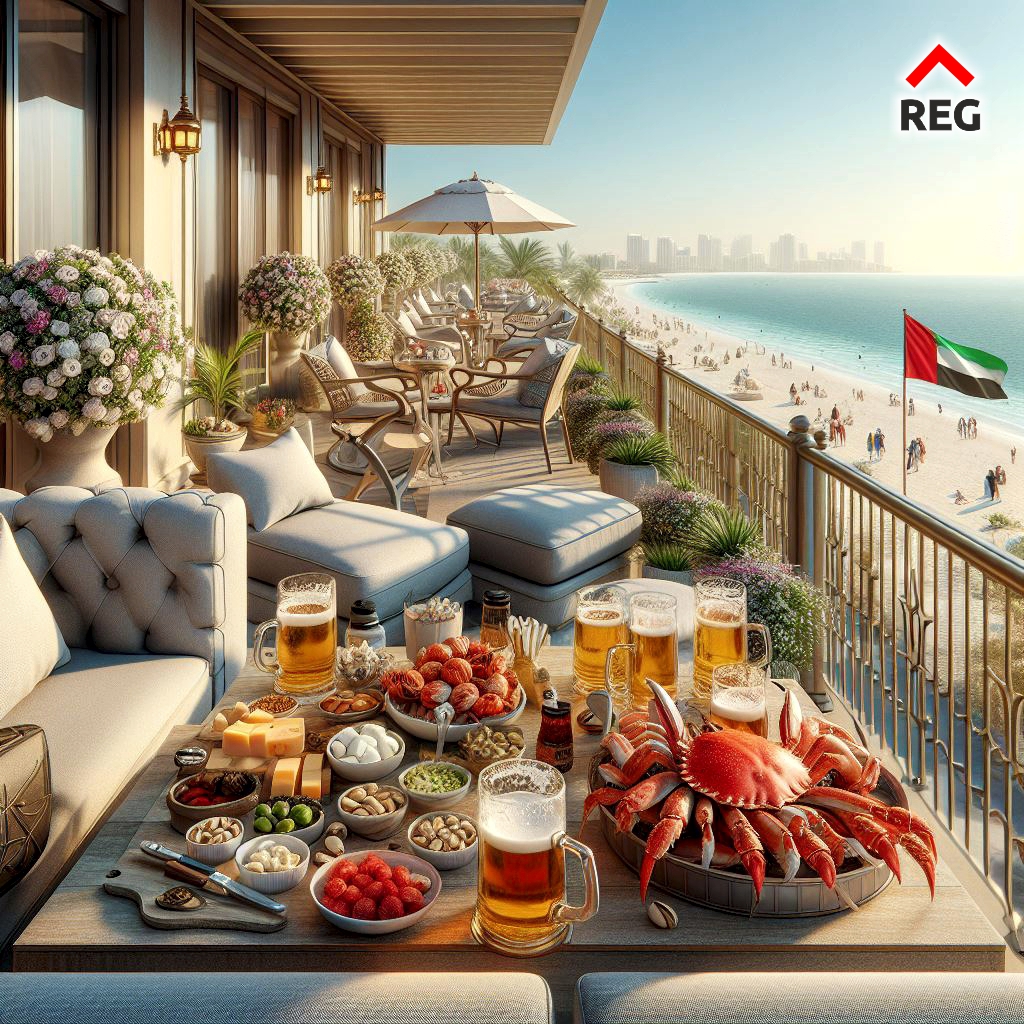
Strategy 3: Buying and Reselling.
Buying and reselling is a strategy that involves buying apartments in residential complexes under construction with subsequent resale for a quick profit. This strategy can generate a high return on investment (ROI) in a short period of time, if the investor can find a good deal, sell the property at a higher price, and avoid any delays or disputes.
However, buying and reselling also involves a number of costs and charges that the investor will need to pay in Ras Al Khaimah in 2024, such as:
- Booking fee: This is a fee that is paid to the developer for booking the property and securing the unit. The booking fee is usually 5% to 10% of the property value, which is paid upfront. Therefore, the investor will need to pay the booking fee when buying the property.
- Installment payments: These are the payments that are made to the developer for paying the remaining balance of the property value, according to the payment plan agreed between the parties. The installment payments are usually a percentage of the property value, which are paid at regular intervals or upon completion of certain milestones. Therefore, the investor will need to pay the installment payments as per the payment plan when buying the property.
- Transfer fee: This is a fee that is paid to the Real Estate Department (the Department) at the RAK Municipality for transferring the ownership of the property from the seller to the buyer. The transfer fee is 4% of the property value, which is split equally between the seller and the buyer. Therefore, the investor will need to pay 2% of the property value as a transfer fee when selling the property.
- Registration fee: This is a fee that is paid to the Department for registering the property and the property rights on the Real Estate Register, which is a database that records the details of all real estate properties and transactions in Ras Al Khaimah. The registration fee is 1% of the property value, which is split equally between the seller and the buyer. Therefore, the investor will need to pay 0.5% of the property value as a registration fee when selling the property.
- Agency fee: This is a fee that is paid to the real estate agent or broker for facilitating the sale of the property. The agency fee is usually 2% of the property value, which is paid by the seller. However, some agents or brokers may charge a different percentage or a fixed amount, depending on the agreement between the parties. Therefore, the investor will need to pay the agency fee as agreed when selling the property.
- Capital gains tax: This is a tax that is paid on the profit made from selling the property. The capital gains tax is 10% of the net profit, which is the difference between the selling price and the purchase price, minus any expenses incurred in relation to the property. Therefore, the investor will need to pay the capital gains tax as long as they make a profit from selling the property.
Want to Buy Real Estate in Ras Al Khaimah? Write a Request in WhatsApp and Real Estate Group Will Find the Best Options for You. Everyone Buys With Us!
Strategy 4: Buying and Renting.
Buying and renting is a strategy that involves buying apartments in residential complexes under construction and then renting them out for a period of 1 year or more. This strategy can generate a steady income stream and a long-term capital appreciation for the investor, if the investor can find a good deal, maintain the property well, and find reliable tenants.
However, buying and renting also involves a number of costs and charges that the investor will need to pay in Ras Al Khaimah in 2024, such as:
- Booking fee: This is a fee that is paid to the developer for booking the property and securing the unit. The booking fee is usually 5% to 10% of the property value, which is paid upfront. Therefore, the investor will need to pay the booking fee when buying the property.
- Installment payments: These are the payments that are made to the developer for paying the remaining balance of the property value, according to the payment plan agreed between the parties. The installment payments are usually a percentage of the property value, which are paid at regular intervals or upon completion of certain milestones. Therefore, the investor will need to pay the installment payments as per the payment plan when buying the property.
- Transfer fee: This is a fee that is paid to the Real Estate Department (the Department) at the RAK Municipality for transferring the ownership of the property from the developer to the buyer. The transfer fee is 4% of the property value, which is paid by the buyer. Therefore, the investor will need to pay 4% of the property value as a transfer fee when buying the property.
- Registration fee: This is a fee that is paid to the Department for registering the property and the property rights on the Real Estate Register, which is a database that records the details of all real estate properties and transactions in Ras Al Khaimah. The registration fee is 1% of the property value, which is paid by the buyer. Therefore, the investor will need to pay 1% of the property value as a registration fee when buying the property.
- Agency fee: This is a fee that is paid to the real estate agent or broker for facilitating the purchase and rental of the property. The agency fee is usually 2% of the property value, which is paid by the buyer, and 5% of the annual rent, which is paid by the tenant. However, some agents or brokers may charge a different percentage or a fixed amount, depending on the agreement between the parties. Therefore, the investor will need to pay the agency fee as agreed when buying and renting the property.
- Maintenance fee: This is a fee that is paid to the master developer or the owners’ association for maintaining the common areas and facilities of the property, such as the lobby, the elevator, the swimming pool, the gym, the security, and the landscaping. The maintenance fee is usually calculated based on the size of the property and the level of service provided. Therefore, the investor will need to pay the maintenance fee as long as they own the property.
- Utility bills: These are the bills that are paid for the consumption of water, electricity, gas, and other utilities in the property. The utility bills are usually calculated based on the meter readings and the tariff rates. Therefore, the investor will need to pay the utility bills as long as they own the property. However, some investors may choose to pass on the utility bills to the tenants, depending on the agreement between the parties.
- Rental income tax: This is a tax that is paid on the income generated from renting the property. The rental income tax is 10% of the gross annual rent, which is deducted at source by the Department. Therefore, the investor will need to pay the rental income tax as long as they rent the property.
